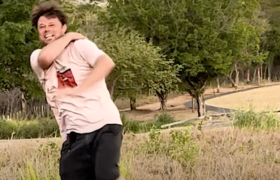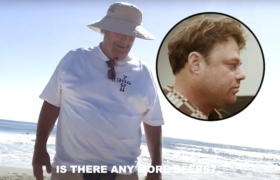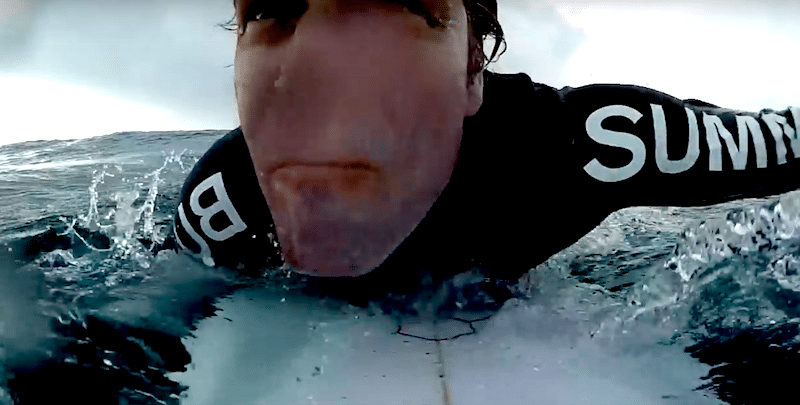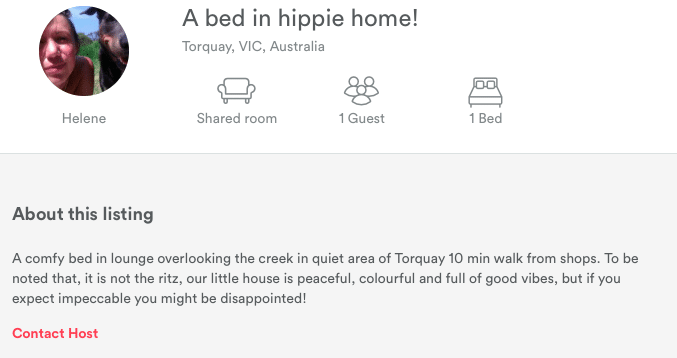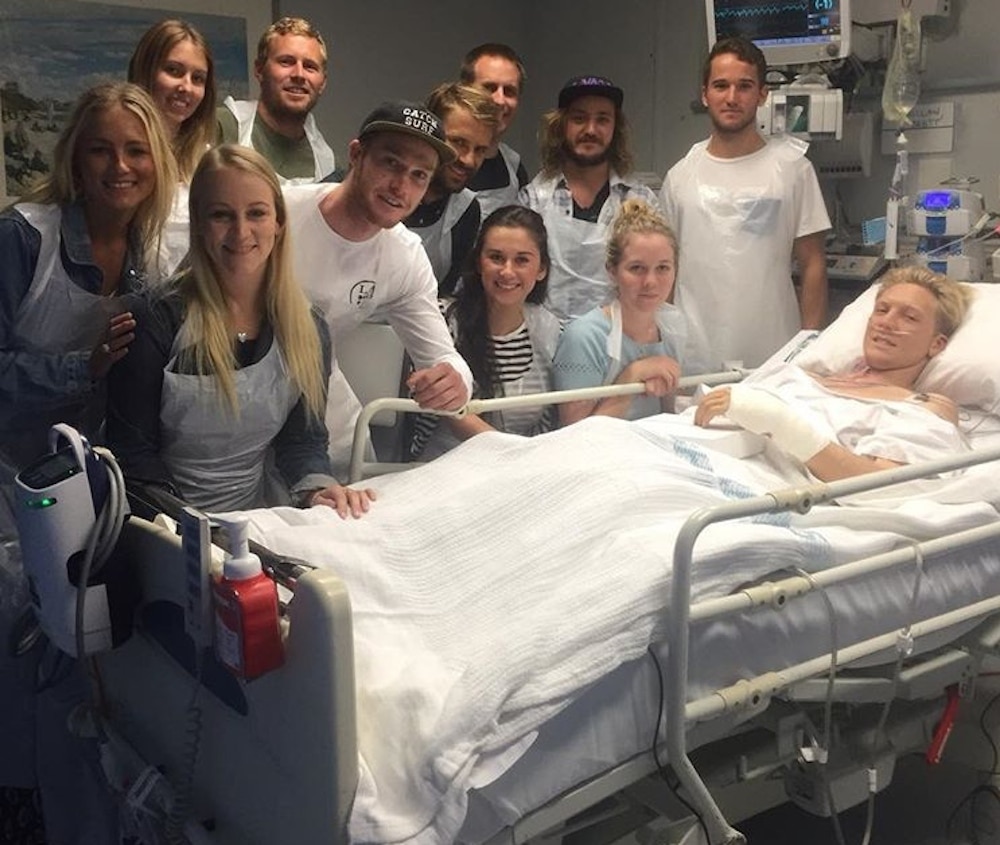Jamie Brisick's ode to a dead lover…
(Editor’s note: The American writer Jamie Brisick lost his Brazilian wife Gisela in a traffic accident three years ago. One year after her death, he wrote The Dazzling Blackness, reprinted below, and, recently, made a short film Rhymes with Shove, “an allegory of lost love” which you can watch at the bottom of the page.)
On the morning of April 1, 2013 I woke to a text message from a friend in Rio telling me to call her “now.” I was in New York. I dialed her number. In hysterics, in guttural whimpers I’ll never ever forget, she told me that my wife had died—“She’s gone, Jamie! Gisela died! She’s gone!” Through her sobs, I could just make out that that my wife had been in an accident on her bicycle, hit by a bus on the street in Leblon.
A pain—more than a pain, a seizure, a paroxysm of breathlessness—gushed up from deep inside me. I fell out of bed and writhed on the floor. I wrapped my body around a pillow and, sobbing uncontrollably, pretended it was Gisela. I got up and lurched into the foyer of our apartment. Standing in the corner was a dress form I’d gotten her for Christmas a couple years back. It was clothed in her checked Uniqlo skirt and her powder blue corduroy blazer. I wrapped my arms around it, wrestled it to the floor, and hugged it tightly, hoping it might suddenly come to life as Gisela, the whole thing a bad dream.
So began the most difficult year of my life.
For the first week I was afraid to drink. The sorrow and grief felt like an undertow. I figured one sip might lead to several bottles. I was in shock. The world was a new and unfamiliar place. I did not want to be here. I wasn’t exactly suicidal, but there was no fight left in me. Live? Die? Flip a coin.
I signed up with a good therapist, read several books about grief/loss/depression, added 900mg of St John’s Wort to my day, ate reasonably well, exercised a lot, slept as best I could. None of it seemed to help. I felt hopeless. I didn’t care.
A month or two in I started drinking. Not a whole lot, but, say, ¾ to a full bottle of wine per night, drunk slowly, usually while writing. It wasn’t the quantity I was worried about, it was the vicious circle. I was depressed, I drank alone to quell the depression, I cried constantly, so bad I’d get a new kind of headache, a very specific “crying headache.” I’d wake in the morning with a wine/tears hangover, anxious to get through the day so I could crack the next bottle and start it all over again.
Then there was the sex part. I’d read that it in the throes of grief it’s not uncommon to feel heightened sex drive. I experienced this in a ravenous, painful way. My sad nights consisted of wine, masturbation, self-pity. I just wanted to escape the living hell that I found myself in.
And that’s how most of my 2013 went: going through the motions, a sorrow beyond anything I ever could have conceived of.
There was a push-pull. On the one hand I wanted the pain to let up. On the other, in the depths of my pain, Gisela was most vivid. If someone had said, “I can wave my magic wand and fast-forward you a couple years into the future, the rough days behind you, but of course that means you and Gisela will be further away from each other,” I’d have said without question, “No thanks.”
Typically when life gets challenging we counter with grit, we roll up our sleeves and work harder, we push back. Grief is passive. It’s a ride on which you have no control.
And on some level I took the whole thing personally. It felt as if God had set out to explicitly fuck me. If I’d have run into him on the street, I’d have walked straight up to him, hawked up bile from the depths of my broken innards, and spat it right in his face.
* * * * *
Gisela and I met in New York City in 2001. She was from Sao Paulo; I was from Los Angeles. I felt something unstoppable from the moment I met her. For her it took a while longer. We spent Carnaval 2002 together in Venice, went to Milano and Rome, fell in love. We moved to New York. Married in 2004. We made a wonderful life together, traveled all over, worked hard. She directed TV programs and documentaries; I wrote stories for magazines, books. At the center of our relationship was a giant curiosity and love for the world. We taught each other about loyalty and intimacy, how to share space. “We’re going to grow old together,” she used to say. I’ve never felt closer to another person.
Ten months before she died I went into some sort of mid-life crisis. It’s too long and complicated to get into here, but the upshot was that we were not together at the time of her passing. There was so much we had to work out. So much we were working out.
* * * * *
Here’s where grief posed the biggest challenge: For most of my life I have prided myself on living in the moment. I travel. I surf. I practice yoga. I meet new people. But the looping narrative that played in my head was the antitheses of that. I was stuck on the idea that I’d been wronged, that the world was a terrible place. And to challenge that ten times further still: I did not want to get out of it. I felt I’d earned the right to be negative, to play the victim.
In February of this year I went to Australia for two months. The new surroundings did me all kinds of good. I wrote, surfed, heard a faint voice in my head that said, Hang on, have faith, life will get better, Gisela would want to see you happy. I started caring again.
One night I was telling a good friend about all I’d been through. “There was so much unfinished business between Gisela and me,” I said. “And now all I have left is this one-way conversation with the sky.”
A light seemed to switch on in her face. “Have you ever tried meditating?” she asked, and proceeded to tell me about the couple of bad breakups she’d been through, her bout with depression, the meditation course she’d done and how it helped give her new insights into her life, how she was able to be more detached, more centered, less ragdolling through emotions.
A couple days later another close friend suggested meditation. I took it as a sign.
In March I took a three-day Vedic Meditation workshop. I’d tried to meditate in the past, but never felt like I was doing it right. I had “monkey mind,” i.e., endless chatter. The workshop taught me that this is okay, that it’s a matter of simply observing our thoughts, accepting them, then gently, lovingly directing toward quiet. There’s no real right or wrong; it’s more just the inner gaze that counts, that and doing it everyday.
For me, grief has highlighted our human need for escape—through sex, drugs, sport, TV, movies, music, et al. Meditation accesses something similar, a place where time skips, where we forget ourselves. I’ve been meditating pretty much everyday for the last month. It’s definitely helped. The sublime moments are far and few between, but with practice they seem to be happening more frequently, and lasting longer. That’s enough for me to keep at it.
